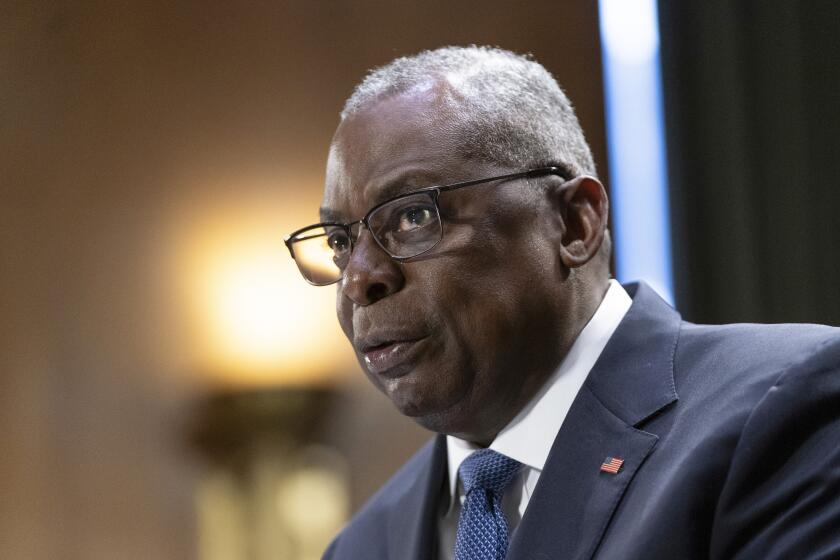Defense secretary released from hospital after complications from surgery he kept secret

- Share via
WASHINGTON — Defense Secretary Lloyd J. Austin III was released from the hospital Monday, after spending two weeks there to treat complications from surgery for prostate cancer he kept secret from senior Biden administration leaders and staff for weeks.
Austin will be working from home as he recovers, and his doctors said he “progressed well throughout his stay and his strength is rebounding.” They said in a statement the cancer was treated early and his prognosis is “excellent.”
In a statement, Austin expressed thanks to the medical staff and said that “as I continue to recuperate and perform my duties from home, I’m eager to fully recover and return as quickly as possible to the Pentagon.”
Austin, 70, was admitted to Walter Reed National Military Medical Center on Dec. 22 and underwent surgery to treat the cancer, which was detected earlier in the month during a routine screening. He developed an infection a week later and was hospitalized Jan. 1 and admitted to intensive care.
Dr. John Maddox, the trauma medical director, and Dr. Gregory Chesnut, the director of the Center for Prostate Disease Research at Walter Reed, said that during Austin’s hospitalization he underwent medical tests and was treated for lingering leg pain. They said he has physical therapy to do but there are no plans for further cancer treatment other than regular checks.
The Pentagon is releasing new details about Defense Secretary Lloyd J. Austin III’s continued hospitalization, which has been kept under wraps.
President Biden and senior administration officials were not told about Austin’s hospitalization until Jan. 4, and Austin kept the cancer diagnosis secret until Tuesday. Biden has said Austin’s failure to tell him about the hospitalization was a lapse in judgment, but the Democratic president insists he still has confidence in his Pentagon chief.
During Austin’s time at Walter Reed, the U.S. launched a series of military strikes late last week on the Iranian-backed Houthis in Yemen, targeting dozens of locations linked to their campaign of assaults on commercial shipping in the Red Sea. Working from his hospital bed, Austin juggled calls with senior military leaders, including Gen. Erik Kurilla, head of U.S. Central Command, and White House meetings to review, order and ultimately watch the strikes unfold over secure video.
The U.S. and British militaries bombed more than a dozen sites used by the Iranian-backed Houthi rebels in Yemen, in a massive retaliatory operation.
The lack of transparency about Austin’s hospitalization, however, has triggered administration and Defense Department reviews on the procedures for notifying the White House and others if a Cabinet member must transfer decision-making authorities to a deputy, as Austin did during his initial surgery and a portion of his latest hospital stay. And the White House chief of staff ordered Cabinet members to notify his office if they ever can’t perform their duties.
Austin’s secrecy also drew criticism from Congress members on both sides of the political aisle, and Rep. Mike Rogers, an Alabama Republican who is chairman of the House Armed Services Committee, said he has opened a formal inquiry into the matter. Others openly called for Austin to resign, but the White House has said the Pentagon chief’s job is safe.
It is still unclear when Austin will return to his office in the Pentagon or how his cancer treatment will affect his job, travel and other public engagements going forward. Deputy Defense Secretary Kathleen Hicks has been taking on some of his day-to-day duties as he recovers.
More to Read
Sign up for Essential California
The most important California stories and recommendations in your inbox every morning.
You may occasionally receive promotional content from the Los Angeles Times.















